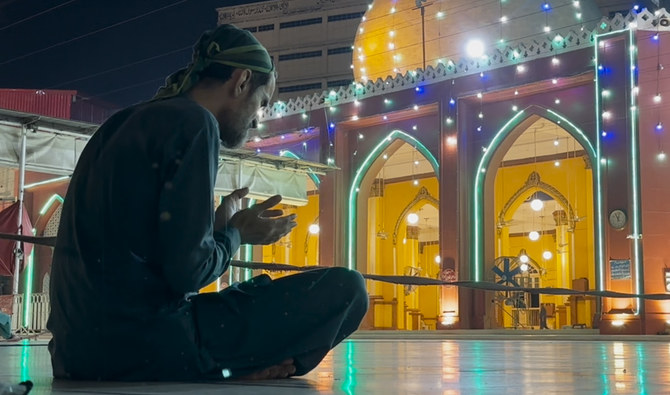KARACHI: As the lights dimmed around Karachi’s bustling Bolton marketplace area at midnight, Mehmood Shehzad stepped up to the pulpit in one of Pakistan’s oldest and grandest mosques, the New Memon Masjid, and announced that it was time for Shabeena.
Worshippers immediately started to gather at the mosque in the southern port city of Karachi for the special midnight prayers typically held during the last ten days of the holy month of Ramadan. Rows quickly formed in front of the pulpit and a reciter, or a qari, stepped up to lead the prayers.
Shabeena voluntary prayers last for over an hour, and involve the qari reciting three to four chapters of the Holy Qur’an as the faithful listen and imbibe.
The magnificent Memon Masjid, situated in Karachi’s main business district, has been hosting Shabeena prayers since it was built in 1949, inviting renowned qaris from all over the country to recite chapters from the Holy Qur’an during the 10-day prayers.
“This tradition is going on since then and Alhamdulillah, those who recite and listen to the Qur’an stand with the same enthusiasm,” Shehzad told Arab News at the mosque earlier this week.
During the last ten days of Ramadan, he said, three chapters of the holy book were recited on each odd-numbered night and four chapters on each even-numbered evening.
“EFFORTLESS PRAYER”
The Memon Masjid is spread over an area of 17,280 square yards, with its main hall measuring 27,000 square feet, with a capacity to accommodate 10,000 people at a time. During Ramadan evenings, the mosque becomes the bustling center of the market area and is also known for its lavish iftar spreads that serve thousands of people daily. Many worshippers even come from other neighborhoods for the Shabeena nights here.
Khurram Zia, a 34-year-old worshiper, said he had been attending Mehfil-e-Shabeena at Memon Masjid for the past several years, adding that the purpose of the voluntary prayers, or nawafil, was to seek Laylat Al-Qadr, the night when Muslims believe the Qur’an was first revealed. According to various hadiths, its exact date is uncertain but it was one of the odd-numbered nights of the last ten days of Ramadan.
“During the last ten days of Ramadan, Allah Almighty has designated Laylat Al-Qadr, so people listen to the Qur’an at the Mehfil-e-Shabeena,” Zia said.
The prayers are physically difficult as one has to listen to a complete chapter in two rak’ahs, which means standing for up to 25 minutes.
“Apparently, it seems like a difficult act of worship, and people may be reluctant thinking it’s a voluntary worship and they will have to exert effort,” Zia said. “But once you start listening to Mehfil-e-Shabeena, the Qur’an has such attraction that you will feel fatigued but still enjoy it.”
Muhammad Ali, a 51-year-old video editor who started attending Shabeena prayers for the first time this Ramadan, agreed and said he had found “great contentment” in the nightly prayer service.
“I am enjoying it very much. it feels great, there’s no sense of fatigue,” he said. “I was told it’s very challenging. Yet, I came with the intention to offer and now I’m offering these prayers effortlessly.”
















